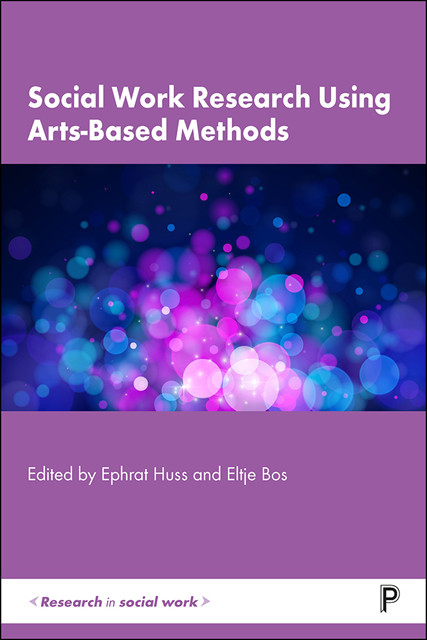Book contents
- Frontmatter
- Dedication
- Contents
- List of figures and tables
- Notes on contributors
- Introduction
- Section I Arts-based research as a method to understand and give voice to marginalised groups
- Section II Using arts-based research to listen to, and give voice to, children in social work
- Section III Arts-based research as a way for researchers and community members to understand communities
- Epilogue
- Index
Epilogue
Published online by Cambridge University Press: 13 October 2022
- Frontmatter
- Dedication
- Contents
- List of figures and tables
- Notes on contributors
- Introduction
- Section I Arts-based research as a method to understand and give voice to marginalised groups
- Section II Using arts-based research to listen to, and give voice to, children in social work
- Section III Arts-based research as a way for researchers and community members to understand communities
- Epilogue
- Index
Summary
What did we learn from this book? To summarise, in the first section, arts were used with different populations, including the elderly, cognitively challenged, single mothers, homeless youth, women with addictions, women with refugee status, and the experience of shifting gender identity within these contexts. We saw examples of multiple art methods, both free and directed: These included music recording, directive group art activities, fine art, poetry, photography, and theatre. These were used to capture the phenomenological experience of research participants. This enabled all of us to understand the different groups’ experiences, coping strategies, and evaluation of the settings in which they live.
The second part of this book showed how arts-based research can be used with marginalised children not as projective for psychological diagnosis, but as a way for the children to teach researchers how they cope and what they need. This section included examples of using fine art images as a trigger for a narrative, Photovoice, and shared art activities.
Both the above sections used arts to situate phenomenological experience of service users within specific contexts, and to capture how they experience those contexts. This goes beyond understanding the other, to using their self-defined experience as a basis for interventions and for setting policy.
The final third section of the book used arts-based research methods within community contexts. It focused on methods that create a space for communication within the community about the community, and that help reach a unified community narrative. These methods were used as a participatory and evaluative research methodology. The variety of arts methodologies demonstrated in the book included the use of crafts, painting murals, creative place making, photography, mapping techniques, play-back theatre, ‘rhizomatic storytelling’, and ‘ripple effects’ arts.
The introduction to this book claimed that arts-based research is relevant to social work research specifically. We hope that the chapters have demonstrated this relevance. Many chapters showed how arts-based research helped to excavate and bring forth to be heard, the silenced experiences of marginalised groups, such as the elderly, refugee children, homeless youth, single mothers, and those with physical and cognitive disabilities. Most chapters also situated personal experience within specific social contexts.
- Type
- Chapter
- Information
- Social Work Research Using Arts-Based Methods , pp. 198 - 199Publisher: Bristol University PressPrint publication year: 2022

